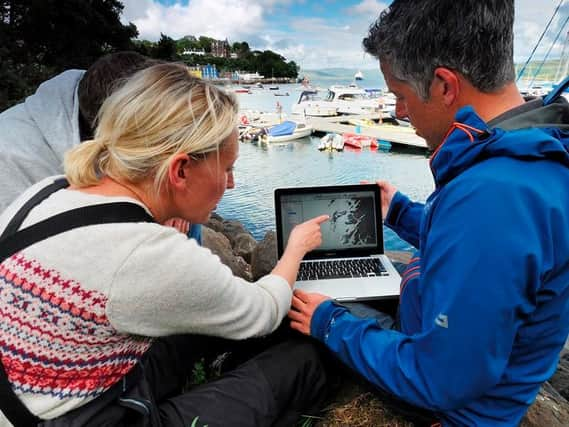Claudia Rowse: It never rains but it pours – climate emergency and skills


But facts show that the number of extreme drought events could increase from an average of one every 20 years to one every three.
Droughts could also potentially last two to three months longer, having wide-ranging implications. We’re also likely to experience more floods and storms in Scotland with rising sea levels likely to flood some coastal communities.
Advertisement
Hide AdAdvertisement
Hide AdThese are just some of the impacts of living with climate change. We understand why there’s a compelling need to reduce emissions, and adapt to a changing climate, but what can we do about it, and what does this mean for skills?
The Climate Emergency Skills Action Plan (CESAP) sets out a comprehensive and compelling overview of the new skills we’re going to need across society as we transition to net zero. Industries are already responding. Many companies have already committed to moving to net zero, including Barclays, Shell and the National Grid. These companies will generate new low carbon jobs and drive the need for new skills.
A great example of future employment opportunities in a net zero economy is the advanced plant growth centre (APGC) in Invergowrie. It’s being developed by industry and academia.
Led by the James Hutton Institute, it aims to secure food supply chains against the impact of climate change and to attract inward investment. They’re developing vertical farming technology to produce a range of food such as salad crops and new varieties that can withstand future pests and diseases. It has attracted £28m of investment and generated 800 new jobs.
This is a good illustration of how future skills for rural Scotland are changing, a key consideration for the Skills Action Plan for Rural Scotland. In many instances, new jobs in rural Scotland including in the land-based sector are will be hi-tech, specialist and highly skilled. It’s incredible to think that some farms of the future will need light engineers, physicists, engineers and computer specialists working alongside plant biologists to provide new crops and local food grown in indoor, vertical farms.
In more traditional agriculture, many innovative farmers are already changing their agricultural systems to farm more closely with natural systems, taking account of biodiversity and soil health at the same time as providing food. Companies like Nestle and Danone provide pull factors, driving dairy farmers to adopt regenerative agriculture, to address the twin challenge of climate change and biodiversity loss.
An initial assessment of the baseline of nature-based jobs in Scotland identified just under 200,000 nature-based jobs in Scotland, approximately 7.5 per cent of the total workforce.
Over the last five years, nature-based jobs have grown five times faster than the Scottish economy as a whole, and are expected to continue to grow.
Advertisement
Hide AdAdvertisement
Hide AdSignificant growth in nature-based jobs, for example in peatland restoration and woodland creation, is anticipated on the back of expansion in activities to meet net zero targets.
At NatureScot, we’re working with many partners including Skills Development Scotland to help to realise opportunities for new jobs presented by the transition to net zero.
Our initial priority focuses on providing skills pathways for young people to enter the nature-based sector.
This includes exploring how to promote and develop the range of apprenticeship models to support young people into nature-based jobs. In many instances, the traditional sectoral approach means that there is a lack of awareness about the growth potential of the green economy, and the type of jobs and new skills required.
New jobs range from peatland ecologists, hydrologists and engineers to jobs in green finance, remote-sensing, natural flood management and low-carbon architecture and sustainable urban planning to name a few.
In addition to the critical need to support young people’s employment opportunities, there is a need for lifelong learning as individuals, communities and organisations understand what the climate emergency means for our lives, our society and businesses.
Those needs were brought into focus by the recent important Dasgupta report on The Economics of Biodiversity, which presents a strong argument for a completely new approach to addressing economic growth - one which accounts for natural capital, and manages nature as our most important asset.
This will generate new jobs in green finance as carbon trading and new markets in ecosystem services develop, - requiring new skills in insurance, investment and banking sectors.
Advertisement
Hide AdAdvertisement
Hide AdAt COP26 in Glasgow later this year we can show the world that we have a plan, energised by our world-leading net zero ambitions.
We can demonstrate the political and public will to implement the plan, highlighting the many opportunities for Scotland to become a more successful country by upskilling and reskilling, and responding to new and emerging industries to realise the job opportunities associated with a low carbon world.
The OECD says ‘climate action can change our lives for the better’, so while Scotland may be famed for its wet weather, we can change our lives for the better by giving our citizens the skills required for the future.
- Claudia Rowse is deputy director of Sustainable Growth with NatureScot
A message from the Editor:
Thank you for reading this article. We’re more reliant on your support than ever as the shift in consumer habits brought about by coronavirus impacts our advertisers.
If you haven’t already, please consider supporting our trusted, fact-checked journalism by taking out a digital subscription.